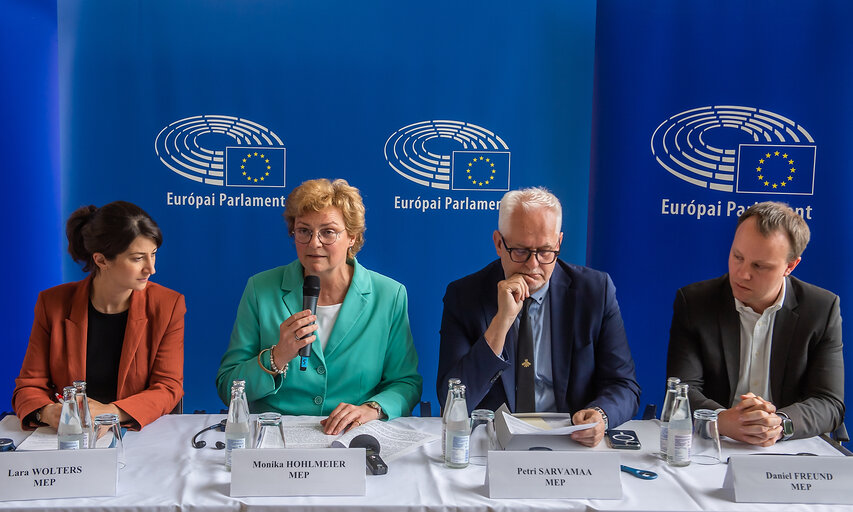A delegation of the European Parliament’s Budgetary Control Committee concluded on Wednesday a three-days fact-finding visit in Budapest with a critical statement on the ongoing issues with the protection of the EU budget in Hungary.
The visit follows the Parliament’s recent discharge debate on the EU’s 2021 budget. The Parliament continues to be worried about the application of the rule of law conditionality mechanism in Hungary and Poland and stated that EU funds should be kept frozen “for as long as the rule of law violations threaten the sound financial management of the Union budget”.
Hungary is the first country where the EU triggered the conditionality mechanism for the protection of the financial interests of the EU. 55 % of three cohesion policy programmes (around €6,35 billion) were frozen in December 2022 “although the facts would have justified the freezing of 100 %”, according to the Parliament.
Hungary has not yet received any payments under the Recovery and Resilience Facility (RRF) pending the implementation of the underlying milestones and targets.
“We spent three days of intense meetings with stakeholders responsible for the management, implementation and control of the EU funds: representatives of the government, audit and tax bodies, members of the opposition, local and regional authorities, businesses, civil society and the press,” MEP Monika Hohlmeier (EPP, Germany) said at the concluding press conference.
She was leading the delegation of six MEPs representing the major political party groups in the Parliament (EPP, S&D, Greens/EFA and Renew). The delegation was also joinded by a member of the European Court of Auditors and observers from the European Commission.
“Our delegation and all our counterparts share the same view - EU funds represent a very big opportunity for the development of Hungary, and for the prosperity of Hungarian citizens, " she said and pleaded with the Hungarian government to implement required measures as soon as possible and in a credible and sustainable way. "We want the EU money to go to Hungary and its citizens."
Whether this will happen is far from certain. To make this happen, 27 so-called super-milestones as well as four horizontal enabling conditions must be implemented without any further delay to finally unblock almost 28 billion euro or over 10.000 billion forints.
In the statement, the delegation noticed several positive developments, such as the set-up of the new Integrity Authority. It also recognised increasing cooperation between the National Tax and Customs Administration and the EU Anti-Fraud Office (OLAF), and the strengthening of the National Judiciary Council.
But the delegation also identified shortcomings during the visit, such as public procurement issues, discriminatory measures against certain businesses, and the effectiveness of State Audit Office.
“Our concerns on the effectiveness of the State Audit Office to adequately audit the planning, implementation and control of EU funds and the functioning of the national authorities were confirmed.”
The delegation’s questions to the State Audit Office concerning misuse, manipulation of tenders, reliability of budget accounts, reporting of fraud cases to the prosecution, remained unanswered. “We asked the Hungarian supreme audit institution why no cases have been prosecuted but did not receive any answers,” MEP Hohlmeier said.
The delegation received conflicting information from the government and the opposition in Hungary. It met government representatives but was disappointed that the minister of justice was not available. The delegation also noted a hostile attitude from Hungarian media. This came hardly as surprise considering the government’s control of most media.
EU funds must reach people and society as a whole, the statement says. “Local and regional authorities raised concerns about their insufficient involvement in the design of the national recovery and resilience plan and the insufficient recognition of their specific needs.”
Everything has to be fulfilled and nothing is agreed until everything is agreed, MEP Petri Sarvamaa (EPP, Finland) underlined. While it is up to the Commission to assess the fulfilment of the conditions, it is not a matter of opinion that Hungary must put an end to the breaches of the rule of law. The EU institutions and the other EU member states agree on that, he said.
The erosion of the rule of law in Hungary did not happen overnight but has taken place during several years. Restoring the independence of the judiciary and the system of checks and balances is essential not only for Hungary but also for EU’s own credibility as an union based on shared democratic values.
M. Apelblat
The Brussels Times

